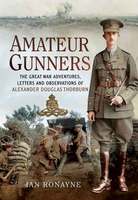If you are interested in Great War artillery or animals in the war or if you are interested in the rise of the British Army in that war then this is a book for you. Artilleryman Alexander Thorburn originally published his memoir in 1933 and, like many of these publications that are seeing the light of day once again, it is fortunate that this work has been resurrected. Editor Ian Roynane has organised the book into three distinct parts, Thorburn’s original memoir, his letters and his ‘observations’ of the war. It is a well-balanced book written for most part in an easy and amusing style.
Thorburn seemed to have enjoyed the war and he does not dwell on the ‘horror’ of it, instead he ably describes the world, people and animals as he sees them. He never rose beyond the rank of captain but one gets the impression that he was not at all bothered. Thorburn was an intelligent and well educated man who had a job to do and he was going to do it well. He was a civilian who was ‘doing his bit’ and he was proud of that distinction. Thorburn was an amateur who was proud of the name, hence the title of his book.
As a gunner he was coldly efficient, not averse to sitting on a pile of corpses to spot for his battery. As an animal lover and a human being he was warm and engaging. After his horses, his colleagues and men were foremost in his thoughts. He would scrounge up supplies and rations for them, either by fair trade or by subterfuge. Wearing a battered trench coat without rank badges he was not beyond allowing senior officers from other units to think that he outranked them in order to get food and supplies for his men and horses.
Gunners are made peripatetic by their trade and Thorburn and his battery were no exceptions to this rule. However, they did not simply move from sector to sector along the Western Front, they moved from country to country. From the Western Front they shipped out to Salonika. From there they moved to Palestine and by 1918 they had returned to the Western Front. Thorburn and the battery started out in 1916 with everything to learn; by 1918 they were a crack gunnery unit and were very good at their jobs. In fact, their story is that of the British Army in the Great War. Thorburn himself was a prime example of the Great War civilian recruit that made the British Army the finest force that the British Isles have ever assembled.
There is a natural tendency in memoirs and diaries for the writer to make themselves the central character in events and to shine up their achievements. In Thorburn’s case his candid style makes his reminiscences quite believable. I often wonder about a writer’s motivation for penning a memoir and this work is no exception. His motivation, apart from providing a literary memorial to his horses, men and himself, appears quite out of the blue in the penultimate chapter of the memoir. Through his memoir he wanted to take the opportunity to set a record straight, to refute the lie that the Nazi Party was peddling in 1930s Germany. That was the notion that the German Army had been undefeated on the field of battle in the Great War. It was a lie that infuriated many of the people who had achieved that victory.
Thorburn’s memoir, that charts the rise of his battery from green recruits to superb soldiers, is his way of saying that the British Army was, by 1918, the best in the world and it did a great deal to bring about victory for the allies. At the end of the penultimate chapter he writes “The German Army was not merely defeated. It was totally demoralised and most of it fled from the battle area as a disorderly rabble…” He was right, men like him, from all walks of life and from all over the world had chased them from the field.
This gunner was an interesting man with a good deal to say and who had a fortunate and varied war. Why not have a dip into his book and his life of almost a century ago as seen through his eyes? You won’t be disappointed.
Review for War History Online by Dr. Wayne Osborne
AMATEUR GUNNERS
The Great War Adventures, Letters and Observations of Alexander Douglas Thorburn.
Edited by Ian Ronayne
Pen & Sword
Originally written by Alexander Douglas Thorburn and published as Amateur Gunners. Published by William Potter, Liverpool, 1933.
ISBN 978 1 78383 201 9
